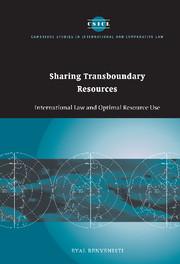Book contents
- Frontmatter
- Contents
- Acknowledgments
- Table of cases
- List of abbreviations
- 1 Introduction
- 2 The need for collective action in the management of transboundary resources
- 3 States as collective actors
- 4 The transnational conflict paradigm: structural failures and responses
- 5 Transnational institutions for transboundary ecosystem management: defining the tasks and the constraints
- 6 The structure and procedure of institutions for transboundary ecosystem management
- 7 The development of positive international law on transboundary ecosystems: a critical analysis
- 8 Efficiency, custom, and the evolution of international law on transboundary resources
- 9 Conclusion
- Bibliograhy
- Index
- CAMBRIDGE STUDIES IN INTERNATIONAL AND COMPARATIVE LAW
5 - Transnational institutions for transboundary ecosystem management: defining the tasks and the constraints
Published online by Cambridge University Press: 14 July 2009
- Frontmatter
- Contents
- Acknowledgments
- Table of cases
- List of abbreviations
- 1 Introduction
- 2 The need for collective action in the management of transboundary resources
- 3 States as collective actors
- 4 The transnational conflict paradigm: structural failures and responses
- 5 Transnational institutions for transboundary ecosystem management: defining the tasks and the constraints
- 6 The structure and procedure of institutions for transboundary ecosystem management
- 7 The development of positive international law on transboundary ecosystems: a critical analysis
- 8 Efficiency, custom, and the evolution of international law on transboundary resources
- 9 Conclusion
- Bibliograhy
- Index
- CAMBRIDGE STUDIES IN INTERNATIONAL AND COMPARATIVE LAW
Summary
The tasks of transnational ecosystem institutions
Chapter 2 concluded with the suggestion that thought should be given to the appropriate international norms that would provide proper incentives for states sharing transboundary natural resources to endogenously establish forms of regional cooperation. As demands for such resources grow and diversify and supplies become increasingly depleted, more and more states may be unable to afford unilateral action and may, therefore, seek cooperation. A body of norms designed to lower the costs involved in such cooperation will hasten its emergence. We began the search for such norms by first noting in chapter 3 that states often fail to cooperate due to domestic conflicts of interests and collusion amongst smaller but politically dominant domestic interest groups. Identifying small groups within states as the prime producers of capture and externalities, chapter 4 offered a remedy in the form of transnational institutions, which could lower the costs of regional cooperation by diminishing the opportunities for small-group domination. Transnational institutions must be tailored to the specific matters they aim to address. Continuing in our quest, this chapter is devoted to an examination of the challenges involved in ecosystem management.
Nowhere is the need to set up transnational institutions more acute than in the sphere of ecosystem management. Management of ecosystems consists of a constant, almost daily balancing of a myriad of demands on a relatively fragile and scarce shared resource. Hence, when the clash between conflicting demands intensifies, the ailments of the Westphalian state system become strongly apparent.
- Type
- Chapter
- Information
- Sharing Transboundary ResourcesInternational Law and Optimal Resource Use, pp. 101 - 130Publisher: Cambridge University PressPrint publication year: 2002
- 1
- Cited by



